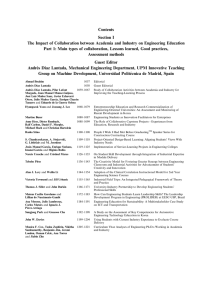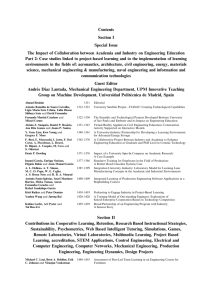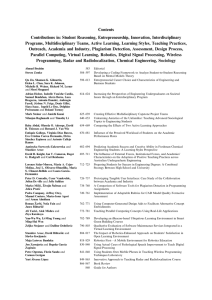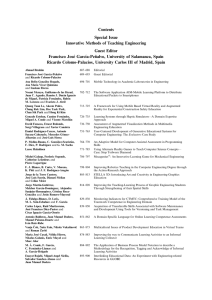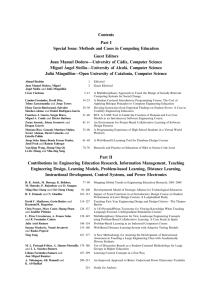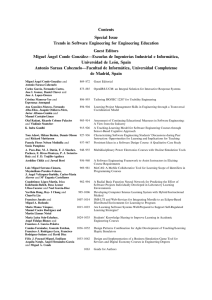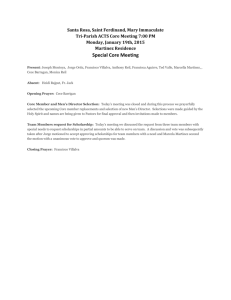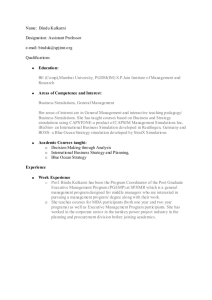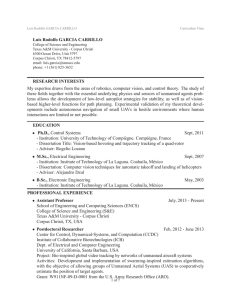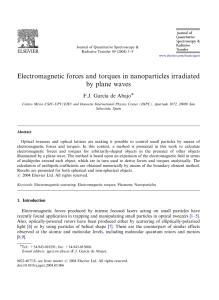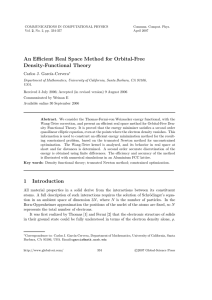Contents Section I Special Issue Learning through Play in Engineering Education—Part 2
advertisement
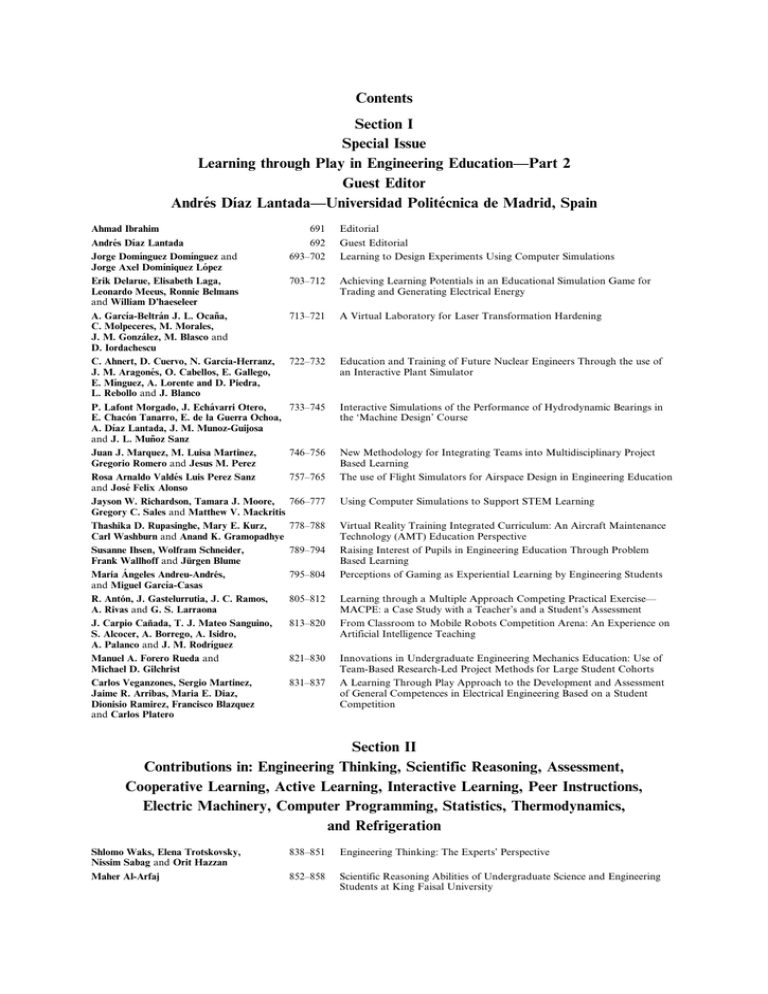
Contents Section I Special Issue Learning through Play in Engineering Education—Part 2 Guest Editor Andrés Dı́az Lantada—Universidad Politécnica de Madrid, Spain Ahmad Ibrahim Andrés Dı́az Lantada Jorge Domı́nguez Domı́nguez and Jorge Axel Domı́niquez López Erik Delarue, Elisabeth Laga, Leonardo Meeus, Ronnie Belmans and William D’haeseleer A. Garcı́a-Beltrán J. L. Ocaña, C. Molpeceres, M. Morales, J. M. González, M. Blasco and D. Iordachescu C. Ahnert, D. Cuervo, N. Garcı́a-Herranz, J. M. Aragonés, O. Cabellos, E. Gallego, E. Mı́nguez, A. Lorente and D. Piedra, L. Rebollo and J. Blanco P. Lafont Morgado, J. Echávarri Otero, E. Chacón Tanarro, E. de la Guerra Ochoa, A. Dı́az Lantada, J. M. Munoz-Guijosa and J. L. Muñoz Sanz Juan J. Marquez, M. Luisa Martinez, Gregorio Romero and Jesus M. Perez Rosa Arnaldo Valdés Luis Perez Sanz and José Felix Alonso Jayson W. Richardson, Tamara J. Moore, Gregory C. Sales and Matthew V. Mackritis Thashika D. Rupasinghe, Mary E. Kurz, Carl Washburn and Anand K. Gramopadhye Susanne Ihsen, Wolfram Schneider, Frank Wallhoff and Jürgen Blume Marı́a Ángeles Andreu-Andrés, and Miguel Garcı́a-Casas R. Antón, J. Gastelurrutia, J. C. Ramos, A. Rivas and G. S. Larraona J. Carpio Cañada, T. J. Mateo Sanguino, S. Alcocer, A. Borrego, A. Isidro, A. Palanco and J. M. Rodrı́guez Manuel A. Forero Rueda and Michael D. Gilchrist Carlos Veganzones, Sergio Martinez, Jaime R. Arribas, Maria E. Diaz, Dionisio Ramirez, Francisco Blazquez and Carlos Platero 691 692 693–702 Editorial Guest Editorial Learning to Design Experiments Using Computer Simulations 703–712 Achieving Learning Potentials in an Educational Simulation Game for Trading and Generating Electrical Energy 713–721 A Virtual Laboratory for Laser Transformation Hardening 722–732 Education and Training of Future Nuclear Engineers Through the use of an Interactive Plant Simulator 733–745 Interactive Simulations of the Performance of Hydrodynamic Bearings in the ‘Machine Design’ Course 746–756 757–765 New Methodology for Integrating Teams into Multidisciplinary Project Based Learning The use of Flight Simulators for Airspace Design in Engineering Education 766–777 Using Computer Simulations to Support STEM Learning 778–788 Virtual Reality Training Integrated Curriculum: An Aircraft Maintenance Technology (AMT) Education Perspective Raising Interest of Pupils in Engineering Education Through Problem Based Learning Perceptions of Gaming as Experiential Learning by Engineering Students 789–794 795–804 805–812 813–820 821–830 831–837 Learning through a Multiple Approach Competing Practical Exercise— MACPE: a Case Study with a Teacher’s and a Student’s Assessment From Classroom to Mobile Robots Competition Arena: An Experience on Artificial Intelligence Teaching Innovations in Undergraduate Engineering Mechanics Education: Use of Team-Based Research-Led Project Methods for Large Student Cohorts A Learning Through Play Approach to the Development and Assessment of General Competences in Electrical Engineering Based on a Student Competition Section II Contributions in: Engineering Thinking, Scientific Reasoning, Assessment, Cooperative Learning, Active Learning, Interactive Learning, Peer Instructions, Electric Machinery, Computer Programming, Statistics, Thermodynamics, and Refrigeration Shlomo Waks, Elena Trotskovsky, Nissim Sabag and Orit Hazzan Maher Al-Arfaj 838–851 Engineering Thinking: The Experts’ Perspective 852–858 Scientific Reasoning Abilities of Undergraduate Science and Engineering Students at King Faisal University A. F. Almarshoud 859–866 Miguel Arevalillo-Herráez and José M. Claver Huei-Chun Huang, Shen-Guan Shih and Wei Cheng Lai Andreja Drobnic Vidic 867–874 Milo D. Koretsky and Bill J. Brooks 897–908 R. Cabello, R. Llopis and D. Sánchez and E. Torrella 909–918 875–884 885–896 919 Developing a Rubric-Based Framework for Measuring the ABET Outcomes Achieved by Students of Electric Machinery Courses Assessment Technique to Encourage Cooperative Learning in a Computer Programming Course Cooperative Learning in Engineering Education: a Game Theory-Based Approach Impact of Problem-based Statistics Course in Engineering on Students’ Problem-Solving Skills Comparison of Student Responses to Easy and Difficult Thermodynamics Conceptual Questions during Peer Instruction REFLAB: An Interactive Tool for Supporting Practical Learning in the Educational Field of Refrigeration Guide for Authors
